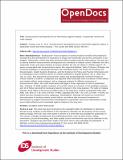Socioeconomic development as an intervention against malaria: a systematic review and meta-analysis
Date
2013-06-19Author
Thompson, John
Tusting, Lucy S
Willey, Barbara
Lucas, Henry
Kafy, Hmooda T
Smith, Richard
Lindsay, Steve W
Metadata
Show full item recordImpact
Abstract
Background
Future progress in tacking malaria mortality will probably be hampered by the development of resistance to drugs and insecticides and by the contraction of aid budgets. Historically, control was often achieved without malariaspecific
interventions. Our aim was to assess whether socioeconomic development can contribute to malaria control.
Methods We did a systematic review and meta-analysis to assess whether the risk of malaria in children aged 0–15 years is associated with socioeconomic status. We searched Medline, Web of Science, Embase, the Cochrane Database of Systematic Reviews, the Campbell Library, the Centre for Reviews and Dissemination, Health Systems Evidence, and the Evidence for Policy and Practice Information and Co-ordinating Centre evidence library for studies published in English between Jan 1, 1980, and July 12, 2011, that measured socioeconomic status and parasitologically
confirmed malaria or clinical malaria in children. Unadjusted and adjusted effect estimates were combined in fixedeffects and random-effects meta-analyses, with a subgroup analysis for different measures of socioeconomic status.
We used funnel plots and Egger’s linear regression to test for publication bias.
Findings Of 4696 studies reviewed, 20 met the criteria for inclusion in the qualitative analysis, and 15 of these reported the necessary data for inclusion in the meta-analysis. The odds of malaria infection were higher in the poorest
children than in the least poor children (unadjusted odds ratio [OR] 1∙66, 95% CI 1∙35–2∙05, p<0∙001, I²=68%; adjusted OR 2∙06, 1∙42–2∙97, p<0∙001, I²=63%), an effect that was consistent across subgroups.Interpretation Although we would not recommend discontinuation of existing malaria control efforts, we believe that
increased investment in interventions to support socioeconomic development is warranted, since such interventions could prove highly effective and sustainable against malaria in the long term.
Citation
Tusting, Lucy S., et al. "Socioeconomic development as an intervention against malaria: a systematic review and meta-analysis." The Lancet 382.9896 (2013): 963-972.More details
http://dx.doi.org/10.1016/S0140-6736(13)60851-XRights holder
The Lancet (Elsevier)Sponsor
DFIDCollections
- ESRC STEPS Centre [225]

